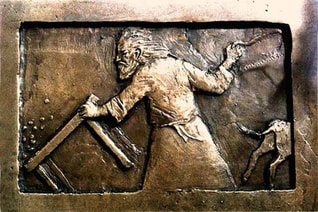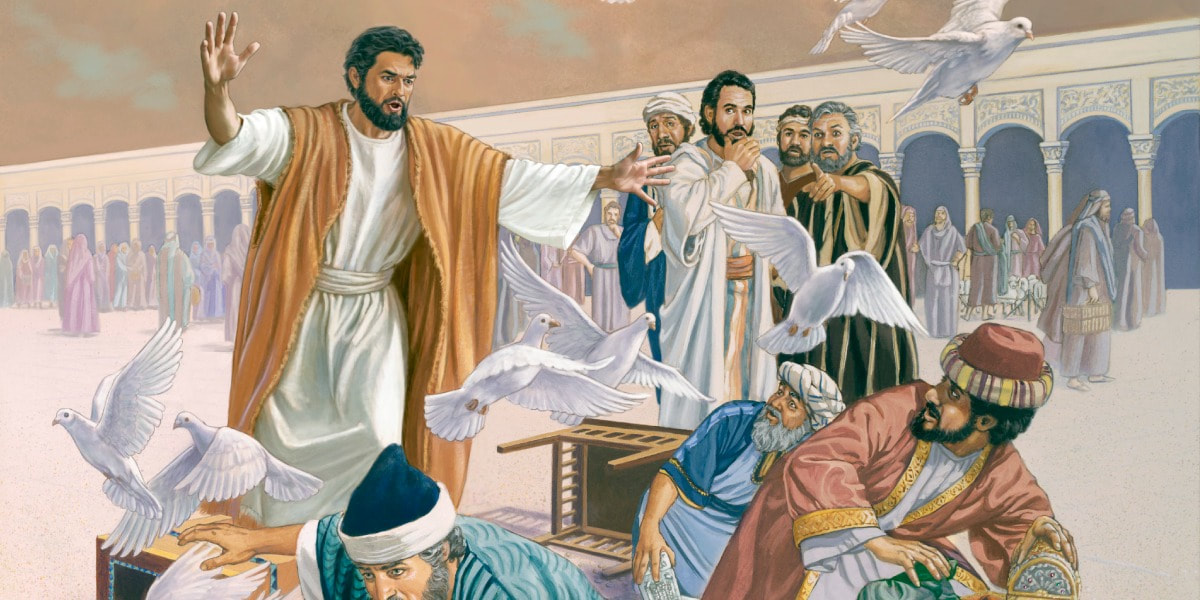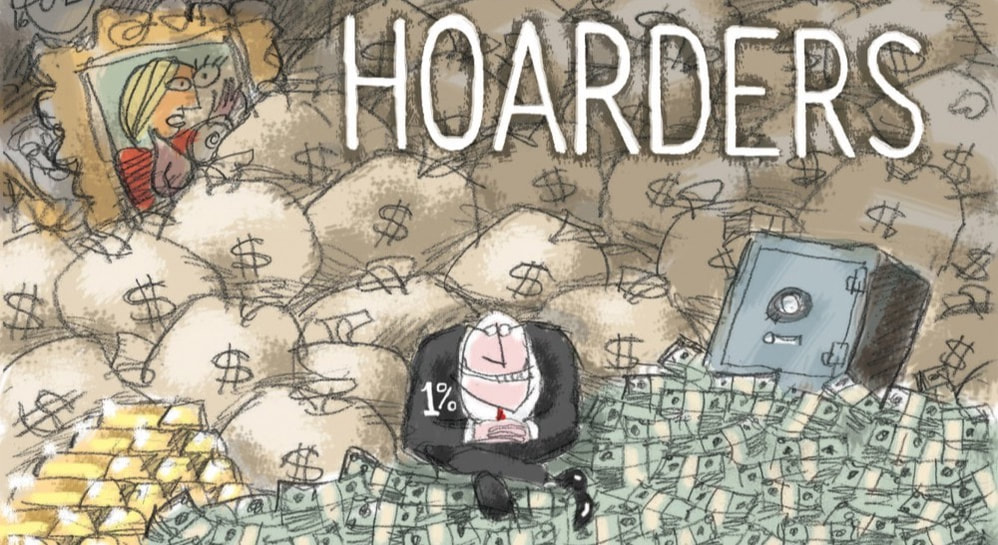
We often miss Jesus' tough message about money because we hear only the parts we want to believe.
Jesus’ distrust of rich people continued a long tradition of Jewish prophets and sages. Proverbs 28:6 points out why: “Better is the poor who walks in his integrity than he who is crooked though he be rich.” Getting rich righteously wasn’t a common storyline in ancient Israel. Entering the upper class indicated some form of corruption. Ben Sira 13.4-5 gives you the reputation of the rich, “A rich person will use you as long as he can profit from it, but when you need him, he will leave you helpless. He will live with you as long as you have anything and will gladly drain you dry.” Ouch.
The prophets raged against the rich for these reasons. Jeremiah attributed greatness and wealth to “deceit,” not entrepreneurial ingenuity (Jer 5:27). Micah believed wealth was created through dishonest business dealings, extortion, and violence, not good old fashioned hard work (Micah 6:11-12). Habakkuk assumed the same thing about excessive wealth, “What sorrow awaits you who build big houses with money gained dishonestly!” (Hab 2:9).
Jesus continues this prophetic tradition in his woe to the wealthy in Luke 6. As Robert Stein puts it in his New American Commentary on Luke, the “rich should not simply be equated with an economic status. It denotes the arrogant, haughty (Prov 28:11; Sir 13:20), and dishonest (Prov 28:6) who oppress the poor (Sir 13:19) and who were the object of the prophets’ criticism (Isa 32:9–14; and esp. Amos 6:1f.).” Jesus’s negative assumptions that wealthy people were greedy, ungodly, and underhanded eventually burst out in his final days of ministry in Jerusalem.

Jesus only got violent once. Do you know why? He was enraged by the corrupt commercial enterprise built around worship in the Temple.
Making money off people’s spiritual zeal was the only issue to make him get physical in his entire career. It transformed him from teacher to riot leader. John’s Gospel describes how he made a small whip to drive animals out of the Temple and flipped over tables and money bins of Jewish businessmen. Contrary to our prayers for economic success, Jesus didn’t celebrate the integration of capitalism and faith.
Now don’t overplay the violence of this episode. The “whip” was a small implement used by animal herders—a few pieces of string or leaves of a plant, twisted together and usually carried by children herding goats or other animals. It is commonly seen in Mediterranean and Middle-Eastern lands, even to the present day. Jesus wasn’t hurting anybody with it. He was just herding animals out of the Temple gates.
Early manuscripts of John add the word “like” (ôs in Greek) before the original reference to “the whip” in John 2:15 to create the expression “like a whip.” Copyists likely wanted to tone down the uncomfortable idea of Jesus wielding a whip. It just wasn’t like Jesus to physically force his will upon people. But in this case of turning God’s house of prayer into a slimy merchants’ bazaar, Mark 11:16 says, “He would not permit anyone to carry merchandise through the temple.” He physically wouldn’t allow it.
That extraordinarily unusual behavior tells us which contemporary voices informed how Jesus felt about wealth.
Jesus’ particular hatred of financial corruption in the Temple mirrors one community in ancient Israel—the separatist movement at Qumran. The Qumran community assumed: “Those who are faithful to God are the poor” (CD-B XIX:5). That is why they wrote in their Psalms Commentary the same thing Jesus said in his beatitudes: “The poor shall inherit the entire earth” (see Vermes, 291). Being poor wasn’t an inherent virtue, but in the religio-political context of 1st Century Israel, righteous people ended up poor while the corrupt profited.
The separatist community at Qumran believed the allure of riches had ruined Israel. The Community Rule of Qumran calls wealth one of Belial’s (i.e., the Devil’s) 3 big traps for Israel (CD IV:17-18). And Israel had fallen into it. In the Habakkuk Pesher, they claim that the ruler in Jerusalem “forsook God and betrayed the Laws in order to get rich.” Specifically, the Habakkuk Pesher condemns Wicked priests for “stealing riches” and “gathering riches from the Gentiles.” The entire community at Qumran had left Jerusalem because of greedy High priests who used their position to turn the Temple into a profitable business. They were waiting for God to judge those rich religious leaders in Jerusalem who had sidelined their spiritual responsibilities to amass wealth.
If Jesus and the entire community at Qumran had equated wealth with ungodliness, then how bad could it have been?
Money changers and merchants in the Temple weren’t originally a bad thing. They were there so Jews from around the world could pay the Temple tax and participate in sacrificial worship. The ancient rabbinic Mishnah describes their purpose at Jewish festivals in Jerusalem like Passover:
Beginning on the 1st of Adar (the month before Passover), a proclamation was made to the people that they should prepare the Shekalim . . . On the 15th day of Adar, moneychangers were sent out to collect the Half-Shekel for its donation . . . On the 25th day of Adar, moneychangers were installed in the Temple itself to help in collecting the Half-Shekel donation. — Megillah 29a-b
Rabbis who lived while the Temple stood in Jerusalem had to fight the corruption. For example, according to Leviticus 12:6-8, after an Israelite woman gave birth, she had to bring a sacrifice to the Temple, preferably a sheep. But if she was poor, she could take two doves or pigeons for the sacrifice, since birds were much less expensive. Because of greed, the market for birds rose so much that poorer women could not afford them. The Jewish Mishnah gives one Rabbi’s response in Kritut 1:7.
If a woman had given birth five times during her life . . . after she brings a single sacrifice, she will be able to eat sanctified foods once again. But she is still under oath to bring four more. It eventually came to pass that the cost of two birds rose dramatically to one gold zuz. Rabban Shimon ben Gamaliel declared: “I pledge that before I go to bed this very night, the price of birds will fall!” He headed straight to the courtyard and instructed the people to obey the following regulation: “After giving birth five times, a woman . . . needs to bring just one sacrificial offering to cover all five births . . . That very day, the price of birds plummeted to one quarter of a silver zuz.”

“Chief Priests” Were Organized Crime
The Temple grounds had become a den of thieves because the “chief priests” had become 1st Century mafia. Wealthy families paid Roman rulers for the right to be high priest. High priests controlled the Temple treasury and the tithe. Josephus, the 1st Century Jewish historian, recounts how the battle for control of the priesthood and the tithe led to gang violence in the time of Nero.
About the time king Agrippa gave the high priesthood to Ismael, who was the son of Fabi, a split formed between the high priests and the main men respected by the mob in Jerusalem. Each group put together a gang of rough characters who loved to mix it up, and became their leaders. When they got into skirmishes, they would yell insults at one another and throw stones. And nobody was there to stop them. These clashes were done freely and flagrantly, as if the city had no government over it. The high priests felt so invincible and bold that that they had the confidence to send their private gangs of ruffians out to seize the tithes intended for the ordinary priests from village threshing floors, leaving the ordinary priests to starve. — Ant. 20.8.8
“Woe to the house of Boethus! Woe to me because of their rods!" (Simon son of Boethus was Herod the Great’s father in-law and high priest during his reign. After Simon died, Eleazar and Joazar, also sons of Boethus, became high priests)
"Woe to the house of Qadros (Cantheros)! Woe to me because of their pens!" (Simon Cantheros was one of the high priests appointed during the rule of Herod Agrippa)
“Woe to the house of Elhanan, woe to the house of whispers!" (Elhanan is translated ‘Ananus or Annas’ in Greek and refers to the high priest Annas of the New Testament and his sons)
"Woe to the house of Elisha! Woe to me because of their pens!"
"Woe to the house of Ismael ben Phiabi! For they are high priests and their sons, treasurers and their sons-in-law who were (temple) officers! And their servants came and beat us up with staves!" (Phabi served as priest for one year from 15-16 A.D. Later, Ishmael ben Phabi was appointed high priest around 56-62 A.D.) — Tosefta, Menachoth 13.21
Wealth & Godliness Don't Go Together
Ancient Jewish wisdom does say, “There is nothing wrong with being rich if you haven't sinned to get that way” (Ben Sira 13:24). And our earliest record of rabbinic oral tradition, the 2nd Century Mishnah, does leave open the possibility of rich people who are faithful to God. “Rabbi Jonathan says: Whoever fulfills the Torah in poverty will ultimately fulfill it in wealth. And whoever neglects the Torah in wealth will ultimately neglect it in poverty” (Pirkei Avot 4:9). These Jewish teachers see nothing inherently wrong with wealth as long as it is obtained honestly and handled according to God’s instructions.
However, Jesus and his contemporaries, who knew the corruption in Jerusalem, did not see a righteous path to riches. Every way that led to wealth required compromising godly values, taking advantage of people, and disregarding God’s design. Getting rich was the same thing as forsaking God. That is why Jesus taught, “You can’t work for both God and wealth” (Matthew 6:24).
The only rich people Jesus ever thought had a good heart were the ones giving their money away (his financial supporters in Luke 8 or Zaccheus in Luke 19 who gave half his possessions to the poor). Everyone else was condemned for getting it unjustly or unlovingly hoarding it like the man who built bigger barns to store his excess (Luke 12:16-21). Jesus fundamentally believed that accumulating unnecessary wealth meant taking assets other people needed. Even if we don’t send angry mobs to steal tithes from starving priests like the Chief Priests did in ancient Judea, excessive wealth concentration (the kind that required bigger barns to store in Jesus’ day and now takes brokerage accounts, S-corps, and living trusts to hide) is earthly comfort that compromises heaven’s values. That’s what drove Jesus to bless the poor and judge the wealthy.

According to Jesus, the worst form of corruption profits from pure spiritual devotion. That’s why he shut down monopolizing merchants in the Temple. Turning a poor woman’s desire to worship God into an opportunity to turn a profit is the height of unethical wealth-building. That’s why every best-selling Christian author who like Rick Warren gives away his profits to fuel further ministry is following the path of Jesus. But every pastor purchasing a $3 million home or flying in a privately owned jet is not. Taking from God’s flock so the shepherd can drive a luxury car isn’t the kind of leadership Jesus exemplified.
To put it simply, you can’t both be building wealth you don’t need and be comfortable around Jesus. If you have found a way to amass a fortune while complying with laws and paying workers fairly, Jesus still thought you should share every asset you didn’t need. He wanted justice in its acquisition and mercy in its distribution.
Here’s a fact all of us capitalistic Christians must face. The entire New Testament has nothing good to say about rich people, unless they generously gave their way out of the upper class (Acts 2:45-47; 1 Timothy 6:17-19). High income is fine if you give away every dollar you don’t need. It’s the tension between mercy and greed. Jesus didn’t care about the American dream of rags to riches. He cared about communities woven together with justice and mercy. And he wanted no integration of wealth creation with the worship of God.
If you are starting to pay people full-time to preserve and compound money you don’t need, Jesus will judge you harshly. Yes, his standard is demanding for rich people. He did say, “it is hard for a rich guy to enter the kingdom of heaven.” In fact, he exclusively came to “preach good news to the poor” not the rich, because he had written them off like the prophets Isaiah, Amos, and Micah before him. He assumed rich people in his day were heartless toward neighbors in need or corrupt in their wealth acquisition, and therefore deserved punishment for their ungodliness. So if you have accumulated wealth beyond your wildest dreams, don’t assume God has blessed you. You should assume God will judge you, and then take time to consider what Jesus wants you to do to become a blessing on earth.







 RSS Feed
RSS Feed
